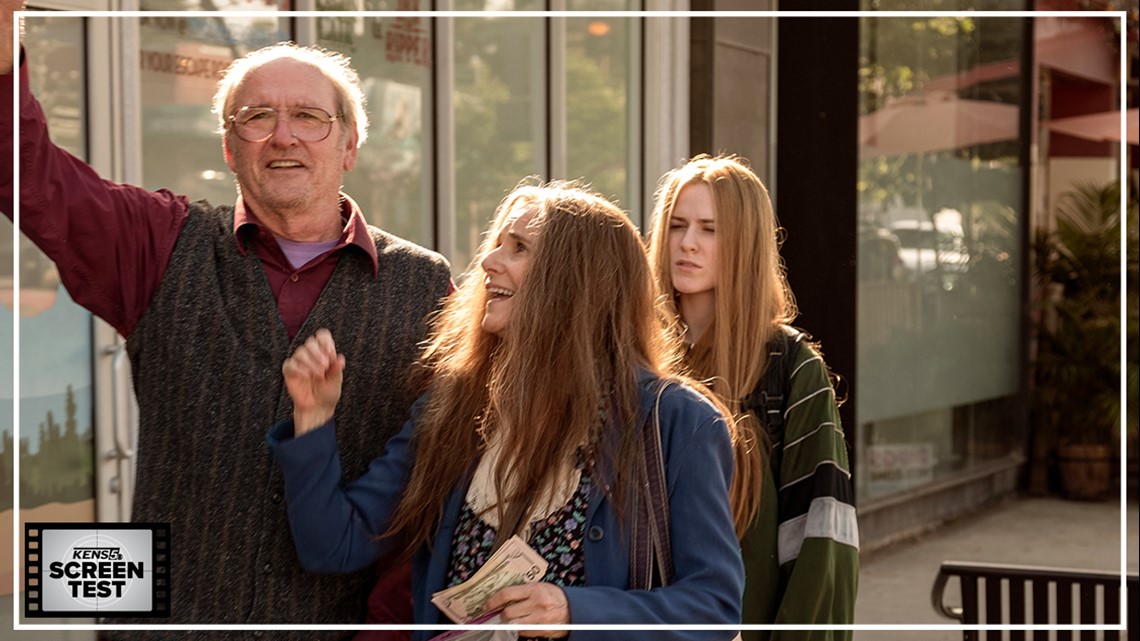[[Note: When "Kajillionaire" opens, it will largely screen at indoor movie theaters during the ongoing coronavirus pandemic. While the purpose of this review goes deeper than binary recommendation to discuss the film's merits as an artistic work in context of its time, we encourage our readers to continue exercising the latest safety guidelines from health authorities and consider them if and when you may decide to visit the cinema to watch this movie.]]
It’s a bit alarming when “Ocean’s 11” and “Mission: Impossible” are casually name-checked in “Kajillionaire.” Something catches us off guard about the suggestion that those megablockbusters could exist within the confines of this comparatively microscopic, unabashedly indie story, one where Los Angeles-based characters live in a distorted reality of experiences limited by destitution and who spend each earth-quaking tremor in preparation for the Big One they’re convinced is coming.
Even as “Kajillionaire” opens with a heist of its own – surely one of the most cheekily lo-fi operations in recent movie history, and conducted not by Cruise or Clooney but by an unassuming Evan Rachel Wood in baggy clothes – the sneakiest act on display is how writer-director Miranda July molds another story fueled by her trademark oddball energy and intense interpersonal bandwidth into what might be her most accessible work of universal emotional appeal. Even as she navigates a forest of quirky dramedy flourishes, there’s no mistaking the subtly profound underpinnings of a tale that confronts suppressed longing with external weirdness. We should be used to July’s Trojan Horse maneuvers by now, but the ways she manages to sneak under our skin anyway are as compelling as ever.
The story begins with Robert Dyne (Richard Jenkins), Theresa Dyne (Debra Winger) and their 26-year-old daughter, Old Dolio (Evan Rachel Wood), preparing for one of those aforementioned capers (if you can call it that). Her parents signal an all-clear and Old Dolio springs into action to rob a post office with the fluid ease of habit, eventually snagging a parcel through methods so tactile they warrant our amusement. The family will try to use the package’s contents to scam someone out of a few hundred bucks, although their motives stem not from malice but from desperation; they’re overdue on rent for the sunshine-less office space they call home. Here, soapy pink bubbles leak through the ceiling every afternoon, on a schedule—the most visually delightful of daily nuisances, and a surefire sign of July’s fizzy spirit. As always, she finds familiarity in the surreal; in her last movie, July herself gave scratchy voice to the existential musings of a cat.
It isn’t the comical opening crime or standoffish parents or foamy intrusions that most strongly encompass July’s idiosyncrasy, however. It’s Wood’s Old Dolio, a remarkably curious presence that finds the actress playing her – recently so formidable and threatening in HBO’s “Westworld” – constantly on the edge of being swallowed up by clothes, if not the mane of hair streaming down both sides of her face. Old Dolio walks as if a stick of wood has grown two legs, and when she talks we’re sure that Wood must be parodying…something. Close your eyes, and you’d guess it were a man talking with their vocal cords throttled wet blanket.
What do we make of her? A life of financial lack (we assume) has reduced her to a mostly non-verbal cog in the schemes of her parents, who regard her less as a daughter and more as an associate. Perhaps that’s why Old Dolio feels a bit stone-hearted and impenetrable; she’s certainly a colder protagonist that July’s movies usually employ (“Kajillionaire” is also the first of the director’s movies that find her staying behind the camera), if not downright infantile.
If the miles of emotional distance feel obvious, perhaps it’s because that’s what July wants us to assume. Soon enough, she and Wood begin to untangle Old Dolio as someone not unaware of the idea of intimacy, but longing for it. She enters, nervously, a “Positive Parenting” class where she’s quietly awed by the sight of an infant. A scene where she’s being massaged – without contact, as if it’s her spirit being de-knotted – finds her in a disarmed state. And when she asks her mom “Did I crawl up, or was I put on a cot?” when she was birthed, it’s with an urgency that Theresa casually dismisses. Old Dolio may start out as a force field in “Kajillionaire,” but she eventually becomes the key to the movie’s humanity. And the film itself becomes an exploration of what we lose in emotional currency when we’re so entrenched in the search for material viability.
The broad implications of that struggle speak for themselves; it’s certainly nothing new for the movies, though the way July approaches it is wholly original. Her stories tend to unfold along the innate strangeness of human interaction and awkwardness of connection. As in her previous movies, “Me and You and Everyone we Know” and “The Future,” there’s a sterility of life in “Kajillionaire” that characters charge themselves with puncturing. The difference here is that the disassociation is class-based; it’s funny when the Dynes freak out as the plane they’re flying in hits some turbulence, but it’s also indicative of the dimension in July’s screenplay brought on by economic struggle.
That dimension finds another side in the form of Gina Rodriguez’s up-tempo and energetic Melanie, who Robert and Theresa easily gravitate toward, although it’s worth wondering why; the elder Dynes welcome Melanie into their cons and begin to treat her like a daughter they never had. Meanwhile, Old Dolio is on the sidelines, perplexed and made even more aware of the affection her parents have neglected to give her. The relationships will soon evolve, and – ironically – disillusionment is what will ultimately bring these characters to their senses.


What all these pieces add up to is a wry, unpredictable and tender story, and also July’s most layered. On one hand, narrative construction has never been more easily discernible in a July film than it is in “Kajillionaire,” though while that somewhat dilutes the raw emotional honesty she tends to bring, it’s also indicative of more complex aspirations. The movie’s thesis can be whittled down to “connection is the root of meaning,” and perhaps “Kajillionaire” does sometimes lull itself into thinking it’s as simple as that. But the despondency of its characters doesn’t grip us more strongly than when it’s harmonizing with abstraction in the movie’s best moments.
One of these is a scene reminiscent of Bong Joon-ho’s “Parasite” that finds Melanie and the Dynes role-playing their way into a bed-ridden victim’s home, eventually adjusting themselves into a life-sized diorama of socioeconomic stability, complete with piano-playing and cake-sharing. The temporary shapeshifting feels instinctual to them, even as we’re the only ones who notice the dark irony that separates their methods from their goals. For them, briefly resembling a family seems to be only a means to an end. And when you consider the irony in that, the movie takes on tragic proportions.
“Kajillionaire” never seriously interrogates the capitalist systems that have placed the Dynes at a disadvantage, but it does confidently walk a fine line between comic absurdity and grounded understanding. Even when July stumbles, it can’t be said that her movie would be easy to mistake for one of the many others with similar thematic foundations of scant resources and rigid existence. But this remains Wood’s show through and through; her evolution harmonizes with the film’s evolution, and in Old Dolio’s eventual newfound individuality does July discover the closest thing she’s created yet to a protagonist whose story ends in triumph.
"Kajillionaire" is rated R for some sexual references/language. It begins screening in select theaters Friday.
Starring: Evan Rachel Wood, Gina Rodriguez, Debra Winger, Richard Jenkins
Directed by Miranda July
2020
OTHER SCREEN TEST REVIEWS
- ‘The Nest’ Review: Jude Law, Carrie Coon spiral toward marital oblivion
- ‘The Secrets We Keep’ Review: Noomi Rapace shines in shoddy morality play
- ‘The Devil All The Time’ Review: Tom Holland leads all-star cast in glum, aimless portrait of a tarnished America
- 'Buoyancy' Review: The cruelties of a corrupt fishing industry are spotlighted in one-dimensional story
- ‘The Social Dilemma’ Review: Another compelling, urgent argument for questioning what shows up in our Facebook feeds
- ‘I’m Thinking of Ending Things’ Review: Charlie Kaufman resumes his search for meaning in haunting Netflix head trip
- ‘Tenet’ Review: Christopher Nolan’s time-bending exercise was made for an audience of one
- ‘Epicentro’ Review: A monumental and monumentally complex observation of Cuba at a crossroads
- ‘Centigrade’ Review: Wintry thriller feels as weary as its trapped victims
- ‘Unhinged’ Review: Russell Crowe is on a rampage in brutal, thematically stagnant thriller



